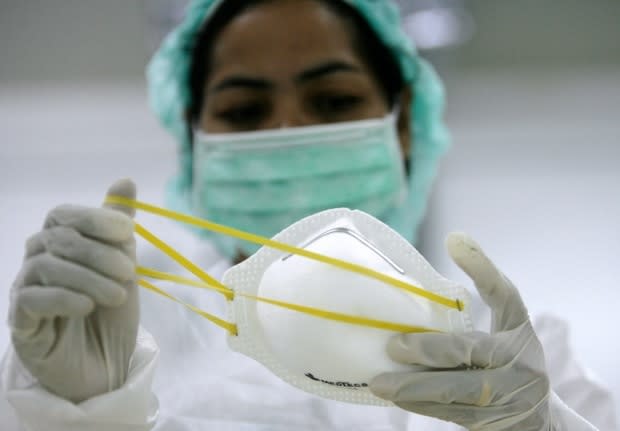Mushrooms, oregano oil and masks targeted in crackdown on misleading COVID-19 ads

A mushroom spray, oil of oregano and a special hat to kill coronavirus in saliva have all been targeted by Health Canada in its crackdown on misleading and false claims of COVID-19 prevention and cures.
The federal health agency has in recent weeks fielded dozens of complaints from Canadians reporting advertisements for products that claim to prevent, treat or cure the novel coronavirus that's so far killed more than 80,000 people in a global pandemic.
In response, Health Canada sent compliance notices to a number of companies, and provided CBC News with a list of 27 cases where the ads were then "withdrawn," along with details of the advertisements. It also contacted CBC's French-language service Radio-Canada regarding an article about one product that erroneously claimed it had been approved by the agency.
The list shows how wide-ranging misinformation around COVID-19 prevention and treatment has become since the pandemic hit Canada, public health experts say.
"I like the fact that they're going after the range, because we're seeing misinformation and inappropriate marketing absolutely everywhere," University of Alberta professor or health law and policy and pseudoscience critic Tim Caulfield said Tuesday.
"The mere fact that there's all these claims out there shows how desperate people are for answers. But it also shows the ability — which is kind of depressing — of people to exploit the situation to sell unproven products."
Canadian and U.S. health authorities continue to stress that there are no medications or health products approved to treat or cure COVID-19. The best way to avoid getting infected, authorities say, is to wash your hands regularly, avoid touching your face, stay at least two metres from other people and remain at home as much as possible.
The 27 notices were for nine products claiming to prevent or treat the virus; eight related to the sale of masks; four related to household disinfectants or hand sanitizer; two related to respirators; and four others that Health Canada says violate the Food and Drug Act.
WATCH | CBC's Marketplace debunks COVID-19 immunity scams:
Claims made on Amazon Canada, for example, included: a mixture of mushrooms that could boost immunity and prevent COVID-19 and a special "anti-dust, anti-fog, anti-coronavirus" hat that could isolate infected saliva.
In a statement to CBC News on Tuesday, the online retail giant said it used both automated filters and human reviewers to remove products with COVID-related claims in their descriptions.
"Health Canada recently alerted us to a small number of products offered by sellers with inaccurate descriptions, which Amazon quickly removed," the company said.
Naturopath claims 'killing effect' of oregano
Two health companies touted oil of oregano.
A health food chain in British Columbia advertised its company-made product by saying, according to Health Canada, "Worried about the latest coronavirus? See how oil of oregano can help!"
A naturopathic office in Toronto claimed a specific oregano oil had "the ability to halt virus replication in host cells infected with the human coronavirus," Health Canada said.
"Oreganol P73 has a potent direct killing effect against the human coronavirus," the office said, according to the compliance notice.

Canadian Senator Stan Kutcher, former head of psychiatry at Dalhousie University in Nova Scotia, said the volume of complaints from the public suggests an increasing awareness of "blatantly false" health information that's being spread right now.
"Some of that information can be dangerous," Kutcher said. "If you tell someone to drink [chlorine] bleach — I mean, that is really bad for you. Stick a hair dryer up your nose? I mean, come on. That's the kind of stuff that we've seen out there."
As prolific as the misinformation has become during the pandemic, Kutcher said he hopes it helps educate the public.
"Let's do a better job," Kutcher said. "But, come on, Canadians. We've also got to up our game to become more science literate, more health literate, so we can separate fiction from facts, so we can separate wheat from chaff, and so that we don't get hooked in by these false claims."
Masks, respirators flagged
Health Canada also found several businesses were selling masks and respirators with claims that they were N95-certified when they were not.
An N95 certification means that a respirator blocks at least 95 per cent of particles 0.3 microns or larger. It's the standard that health-care workers use to protect themselves against coronavirus.

Canadian Tire was affected by a notice regarding masks advertised as N95 that were actually "regular surgical masks," Health Canada said.
A regulatory stop-sale letter was sent to a manufacturer of masks, the federal regulator said in an updated statement on Thursday.
Those masks were sold at a Canadian Tire location in North York, Ont., as well as a Montreal pharmacy, Health Canada said, adding that both locations pulled the products from the shelves after the notice.
The health agency regulates the production, sale and advertising of masks or respirators claiming medical-level protection.
A spokesperson for Canadian Tire said Wednesday that in late January, a vendor had "incorrectly labelled" masks that were sold at one store as "N95-certified."
The retail chain stopped selling the masks, which were available for purchase for less than a day, and offered refunds after learning of the problem, the spokesperson said.
Issues resolved
Those who received notices include an eBay seller, health stores, a pharmacy and a woman selling face masks on her Instagram account. Radio-Canada also received a compliance notice for an article it posted about one of the companies.
In some cases, the companies said they had no intention of misinforming the public, and noted whatever problem Health Canada had flagged was quickly resolved.
One Quebec-based company, Thymox, was told to stop advertising that one of its natural disinfectants could kill SARS and similar viruses. A company spokesperson told CBC News it complied with the order and clarified the language on its website.
Since then, Thymox said it had three of its products approved for Health Canada's COVID-19 disinfectant list.
But before that, Radio-Canada reported on the company's increased sales and erroneously included the claim that its products were approved. That report was highlighted by Health Canada as part of its investigation into Thymox, and the agency said it sent a regulatory letter advising Radio-Canada of an article "that was promoting unauthorized claims."
A spokesperson for Radio-Canada, however, said no one has seen the letter or was aware of it, but that the article in question has been corrected.
'COVID opportunism'
Health Canada investigators also identified problems with a door-hanging advertisement, a newsletter, a media release, signs in stores and website ads.
"It really shows you how misinformation is everywhere, not just on social media," Caulfield said. "They can't go after everyone — this is obviously not a comprehensive list. I kind of look at almost as a symbolic list."
Health Canada said it is preparing to post the compliance order list, and subsequent additions, to its website.
Lorian Hardcastle, a University of Calgary assistant professor who specializes in health regulation, said she expects the list will help educate the public about what's appropriate advertising during the pandemic.
She noted that while some companies may have made claims or sold products mistakenly, she believes the list and other evidence shows some may have been seeking to profit.
"I would probably label it 'COVID opportunism,' and that is where someone sees a niche that they may advertise something that preys on the fear and desperation that a lot of people are experiencing," Hardcastle told CBC News.

To identify possible violations of the Food and Drug Act, the regulator said it monitors websites, works with other agencies, such as the Competition Bureau of Canada, and investigates complaints from the public.
In a statement, a spokesperson said that the department will "use all tools at its disposal to stop these activities," and noted that it's illegal to make false or misleading claims while selling or advertising health products.
Should a compliance notice not be followed voluntarily, companies and individuals may face charges and fines imposed by court.
Hardcastle noted that the Canadian Anti-Fraud Centre, police forces and regulatory colleges for physicians, naturopaths and pharmacists have issued warnings in recent weeks about COVID-19 claims, and those bodies have their own mechanisms for enforcement and legal action.
'Explosion' of claims
Health Canada was doing "a reasonable job at cracking down" on COVID-19 claims, Hardcastle said, "given limits on their own enforcement staff."
"It seems like these sort of products and ads pop up about as fast as the government can respond to them," Hardcastle said. "[Health Canada] didn't have people in place sort of in anticipation of there being this explosion in these kinds of claims."
She said the health agency could consider adding more staff to investigate complaints and enforce its rules.
WATCH | How to properly disinfect at home for COVID-19:
"The damage or the concern here is that people may forgo recommended treatments and may instead pursue these kinds of natural remedies," Hardcastle said.
She also noted that the unregulated products may give people a false sense of security, leading them to be lax in following physical distancing and other guidelines.
Health Canada said it will continue to work with retailers to remove misleading advertisements.
If you have tips on this story or others, email rachel.ward@cbc.ca.

 Yahoo Movies
Yahoo Movies 
